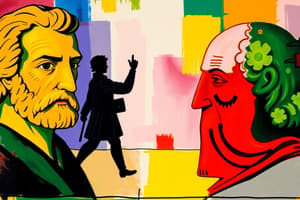Podcast
Questions and Answers
What is the primary function of the International Monetary Fund (IMF)?
What is the primary function of the International Monetary Fund (IMF)?
- To provide military assistance to countries
- To regulate international shipping
- To assist in financial stability and economic growth (correct)
- To promote free trade across nations
Which of the following ships was not part of Ferdinand Magellan's voyage?
Which of the following ships was not part of Ferdinand Magellan's voyage?
- San Antonio
- Cardinal (correct)
- Victoria
- Trinidad
What year marks the declaration of the First Philippine Republic in Malolos, Bulacan?
What year marks the declaration of the First Philippine Republic in Malolos, Bulacan?
- 1899 (correct)
- 1946
- 1896
- 1901
Which form of power involves a leader denying rewards to enforce compliance?
Which form of power involves a leader denying rewards to enforce compliance?
What significant political event in the Philippines occurred in 1986?
What significant political event in the Philippines occurred in 1986?
Which of the following best describes fascism?
Which of the following best describes fascism?
What is a characteristic of a unitary government structure?
What is a characteristic of a unitary government structure?
What does the term 'Sovereignty' refer to in a governmental context?
What does the term 'Sovereignty' refer to in a governmental context?
Who is considered the father of political science?
Who is considered the father of political science?
What type of democracy involves personal participation in decision-making?
What type of democracy involves personal participation in decision-making?
Which of the following theories posits that political authority is derived from divine creation?
Which of the following theories posits that political authority is derived from divine creation?
Which of the following is NOT an element of the state?
Which of the following is NOT an element of the state?
What characteristic is associated with fascism?
What characteristic is associated with fascism?
Which organization was established to replace the League of Nations?
Which organization was established to replace the League of Nations?
Which political ideology is primarily characterized by a rejection of equality and the belief in a supreme race?
Which political ideology is primarily characterized by a rejection of equality and the belief in a supreme race?
What does the social contract theory advocate regarding the origin of states?
What does the social contract theory advocate regarding the origin of states?
Flashcards are hidden until you start studying
Study Notes
Aristotle and Political Science
- Aristotle is considered the father of political science, asserting that man is a political animal.
- His views highlight the potential threat posed by governments, alongside the necessity of moderation encapsulated in the theory of the golden mean.
Types of Slaves
- Sagigilid: Slaves who can be sold to another owner.
- Namamahay: Slaves who retain certain rights.
Scope of Political Science
- Niccolò Machiavelli is recognized as the first modern political scientist; notable work includes "The Prince."
- The study of political science encompasses doctrine, obligation, and actual management.
Elements of State
- People: Considered the most crucial element of a state.
- Territory: The defined physical space of governance.
- Government: The agency through which authority is exercised.
- Sovereignty: Supreme power or authority of the state.
Origin of States
- Divine Right Theory: Belief in leadership ordained by divine power.
- Necessity or Force Theory: States arise from necessity or force.
- Paternalistic Theory: Argues authority stems from familial structures.
- Social Contract Theory: John Locke's idea that government is a contract with the governed.
- Forms of Government:
- Monarchy: Rule by kings or queens.
- Aristocracy: Power held by a privileged class.
- Democracy: Governance by the majority.
Types of Democracy
- Direct Democracy: Individuals directly participate in decision-making, such as in a court.
- Indirect Democracy: Citizens elect representatives to make decisions on their behalf.
Political Ideology
- Represents a system of ethical ideas and doctrines guiding governance.
- Evolved from significant events like the French Revolution starting in 1848.
- Ideologies encompass dominant beliefs and foundational ideas without strong evidence.
Features of Ideology
- World View: Collective beliefs of a group.
- Future Vision: Idea of a desired future state.
- Political Change: Goals aimed at transforming political structures.
Fascism and Dictatorship
- Fascism: A political ideology promoting organized communities and rejecting equality, exemplified by the Nazi regime under Hitler.
- Dictatorship: Centralized power resides in one individual; exemplified by leaders like Ferdinand Marcos SR.
- Main characteristics of fascism include dictatorial authority, suppression of opposition, and regimented society/economy.
Important Global Organizations
- UNO: Established on October 24, 1945, to replace the League of Nations.
- UNESCO: Focuses on education, science, and culture.
- Other significant entities include ADB, CTBTO, ICC, FAO, ILO, ASEAN, IMF, and WTO.
World Wars
- First World War involved 51 member nations.
- Second World War included 193 member nations.
Ferdinand Magellan's Voyage
- Five ships: San Antonio, Trinidad (which Magellan captained), Victoria, Conception, Santiago.
Government Structure
- Unitary Government: Centralized power with a single authority.
- Dictatorial Government: Dominated by one ruler.
Historical Political Movements
- Katipunan Movement: Initiated by Andres Bonifacio.
- Tejeros Assembly: Significant meeting in 1897 for revolutionary factions.
- Biak-na-Bato Pact: Agreement involving Emilio Aguinaldo and Fernando Primo.
- First Philippine Republic: Established in Malolos, Bulacan on January 21, 1899.
Concepts of Power
- Legitimacy: The effectiveness and acceptance of authority.
- Expert Power: Influencing based on specialized knowledge.
- Coercive Power: Utilizes threats or punitive measures to enforce compliance.
- Max Weber's definition of power: The ability of one actor in a social relationship to influence another.
Globalization and Reforms
- Expansion of global markets leads to increased returns.
- EDSA Revolution of 1986: Resulted in the election of Corazon Aquino.
- Presidential Decree No. 1081: Declared martial law in the Philippines.
- Emilio Aguinaldo proclaimed independence on June 12, 1898.
Studying That Suits You
Use AI to generate personalized quizzes and flashcards to suit your learning preferences.




